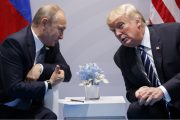
The global chessboard is now going through a reshuffling.
In a noteworthy blow to the ascension of the Russia-China international economic and diplomatic order, Italian Prime Minister Giorgia Meloni’s government told China that Rome is bowing out of China’s Belt and Road Initiative (BRI).
Italy sent Beijing a letter notifying the communist regime of the decision following weeks of negotiations. The news was reported by the Italian outlet Corriere della Sera on Wednesday, although the letter was reportedly sent several days earlier.
The break came after Rome reportedly tried to adjust its agreement with China before the renewal date at year’s end. But Meloni’s petitions were shot down by the communist government.
Chinese President Xi Jinping launched BRI, a money-lending scheme for the purpose of building infrastructure in cash-strapped nations, with the aim of it being something of a modern Silk Road, allowing Beijing to become the center of world commerce and thereby supplant the United States.
The globalist Council on Foreign Relations (CFR), which has written extensively on BRI, described Xi’s vision as “creating a vast network of railways, energy pipelines, highways, and streamlined border crossings, both westward — through the mountainous former Soviet republics — and southward, to Pakistan, India, and the rest of Southeast Asia. Such a network would expand the international use of Chinese currency, the renminbi, and ‘break the bottleneck in Asian connectivity.’”
China has already spent over $1 trillion to build infrastructure around the world as part of BRI, which detractors claim is nothing more than a scheme to get poor nations hopelessly in debt to China (apparently to build them infrastructure that doesn’t even work) and further Chinese global influence.
Breitbart News detailed Italy’s history with BRI:
In 2019, Italy, under the technocratic-globalist government of former PM Giuseppe Conte, became the first member of the G7 to join the Belt and Road project with promises of increased economic growth and investments into Italy from China. However, such promises were left largely unfulfilled, except for investments into Italian ports, which were utilised as a European springboard for China’s fleet of merchant ships.
Conversely, membership in the BRI came with major drawbacks for the European country, with communist apparatchiks using the partnership to exert pressure on Italian media to push forward pro-Beijing narratives.
The outlet further noted that the CCP has made vast efforts to peddle propaganda through the Italian press. For example, a newspaper owned by the family of former Prime Minister Silvio Berlusconi published materials created by Beijing without disclosing this origin to readers. And Ansa, Italy’s state news agency, has published wires from China’s Xinhua news platform.
Now Italy must confront the possibility of facing consequences for leaving the BRI, such as having its products denied access to the Chinese market. In an attempt to smooth things over with China, Meloni’s government reaffirmed ties between Rome and Beijing, suggesting the possibility of renewed attempts to create a “strategic partnership” between the two countries.
Italy may be the only G7 nation to join BRI, but it was not the only member of the European Union to enter into the Chinese scheme. Austria, the Czech Republic, Estonia, Greece, Hungary, Latvia, Luxembourg, Lithuania, Poland, Romania, and Slovakia have all signed up for the Belt and Road Initiative.
In 2021, China overtook the United States to become the EU’s top trading partner. On Thursday, the first EU-China summit since 2019 took place in Beijing. Notable leaders in attendance were European Commission President Ursula von der Leyen and European Council President Charles Michel, who met with Xi Jinping and Premier Li Qiang.
Per the Wall Street Journal, a number of projects financed by the BRI are beset with flaws such as bad cabling, defective fire extinguishing systems, cracked walls, moldy ceilings, and overall sloppy construction.
At one project, the $2.7 billion Coca Codo Sinclair hydroelectric plant in Ecuador, rampant defects have led engineer Fabricio Yépez to worry that “We could lose everything. And we don’t know if it could be tomorrow or in six months.”
Notably, Russian President Vladimir Putin has vowed to tie his own Eurasia vision to the BRI.
Argentine President-elect Javier Milei, who is set to take office on Sunday, has said that he will pull back from the country’s recent friendliness with China, vowing to “not promote relations with communists.”
As The New American previously reported, Argentina under current socialist President Alberto Fernández began trading with China using the yuan rather than the U.S. dollar. The currency swap agreement permits Argentinian exporters to transact yuan or dollars to balance the flows of foreign currencies in the central bank.
China is presently Argentina’s second-largest trading partner, after Brazil, and the second-largest destination for Argentinian exports. In 2021, Argentina’s total imports from China amounted to around $13.5 billion, based on the UN database on international trade.
Given the growth of BRI, BRICs, and other initiatives, China has seemed to be on a roll in the race for global influence.
However, with nations such as Italy and Argentina scaling back their dependence on Chinese money, it appears the diplomatic struggle between Washington and Beijing is far from over.





